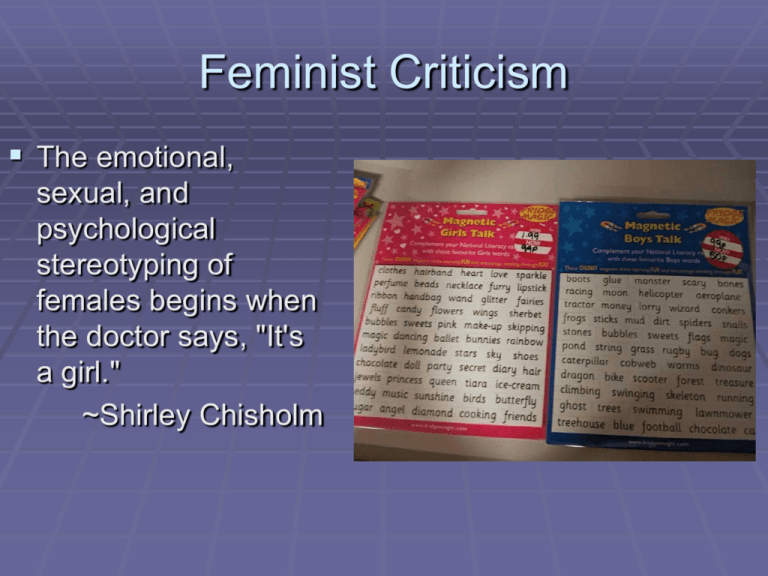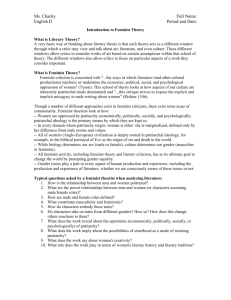
Feminist Criticism
The emotional,
sexual, and
psychological
stereotyping of
females begins when
the doctor says, "It's
a girl."
~Shirley Chisholm
Three Waves of Feminism
First Wave late 1700s-early 1900s
Vindication of the
Rights of Women by
Mary Wollstonecraft
Susan B. Anthony
Women’s suffrage
Three Waves of Feminism
Second Wave early 1960s-late1970s
Equal working
conditions
NOW-National
Organization for
Women
Simone de Beauvoir
Elaine Showalter
Dove-tailed with the
American Civil Rights
Movement
Three Waves of Feminism
Third Wave early 1990s-present
Resists the white,
heterosexual, middle class
focus of second wave
feminism
Alice Walker: “reconcile
[feminism] with the concerns
of the black community…
[and] the survival and
wholeness of her people,
men and women both, and
for the promotion of dialog
and community as well as the
valorization of women and of
all the varieties of work
women perform” (Tyson 97).
Feminist Criticism
Critiques how females are
commonly represented in text
and how insufficient these
representations are as a
categorizing device.
They focus on how femininity
is represented as being
passive and emotional
Example: the “caregiver,” while
the male is associated with
reason and action – the “doer.”
“Ophelia and Laertes (or Ophelia here is
Rosemary)" oil on Canvas. Circa 1880
William Borman Wills
Feminist Criticism
As an addition to the feminist
movement in politics, the
feminist critique of literature
seeks to raise the
consciousness about the
importance and unique
nature of women in literature,
and to point out how
language has been used to
marginalize women.
Specifically, the feminist view
attempts to:
1. Show that writers of
traditional literature have
ignored women and have
presented misguided and
prejudiced views of them
2. Create a critical landscape
that reflects a balanced view
of the nature and value of
women
Specifically, the feminist view attempts to:
3. Expand the literary canon by recovering
works of women of the past and publication
of contemporary female writers
4. Urge transformation in the language to
eliminate inequities and inequalities that
result from linguistic distortions such as
mankind (rather than humanity).
Though a number of different approaches exist in feminist criticism, there exist
some areas of commonality. This list is excerpted from Lois Tyson:
Women are oppressed by patriarchy economically, politically,
socially, and psychologically; patriarchal ideology is the
primary means by which they are kept so
In every domain where patriarchy reigns, woman is other: she
is marginalized, defined only by her difference from male
norms and values
All of western (Anglo-European) civilization is deeply rooted in
patriarchal ideology, for example, in the biblical portrayal of
Eve as the origin of sin and death in the world
While biology determines our sex (male or female), culture
determines our gender (masculine or feminine)
All feminist activity, including feminist theory and literary
criticism, has as its ultimate goal to change the world by
prompting gender equality
Gender issues play a part in every aspect of human
production and experience, including the production and
experience of literature, whether we are consciously aware of
these issues or not (91).
Feminist Critical Questions
How is the relationship between men and women portrayed?
What are the power relationships between men and women (or
characters assuming male/female roles)?
How are male and female roles defined?
What constitutes masculinity and femininity?
How do characters embody these traits?
Do characters take on traits from opposite genders? How so? How
does this change others’ reactions to them?
What does the work reveal about the operations (economically,
politically, socially, or psychologically) of patriarchy?
What does the work imply about the possibilities of sisterhood as a
mode of resisting patriarchy?
What does the work say about women's creativity?
What does the history of the work's reception by the public and by
the critics tell us about the operation of patriarchy?
What role the work play in terms of women's literary history and
literary tradition?
Feminist Criticism Resources
Mary Wollstonecraft - A Vindication of the Rights of Women, 1792
Simone de Beauvoir - Le deuxième sexe, 1972
Julia Kristeva - About Chinese Women, 1977
Elaine Showalter - A Literature of Their Own, 1977;; "Toward a
Feminist Poetics," 1979
Deborah E. McDowell - "New Directions for Black Feminist
Criticism," 1980
Alice Walker - In Search of Our Mother's Gardens, 1983
Lillian S. Robinson - "Treason out Text: Feminist Challenges to the
Literary Canon," 1983
Camile Paglia - Sexual Personae: The Androgyne in Literature and
Art, 1990









